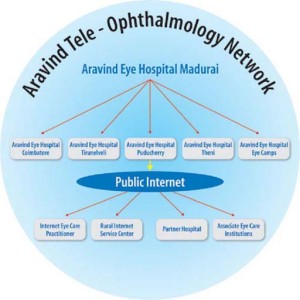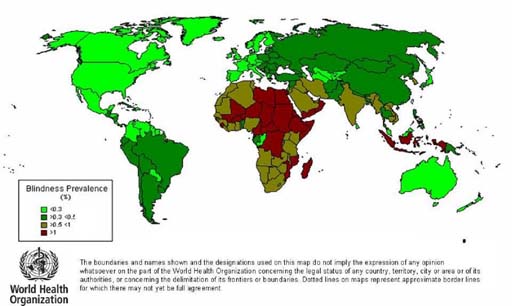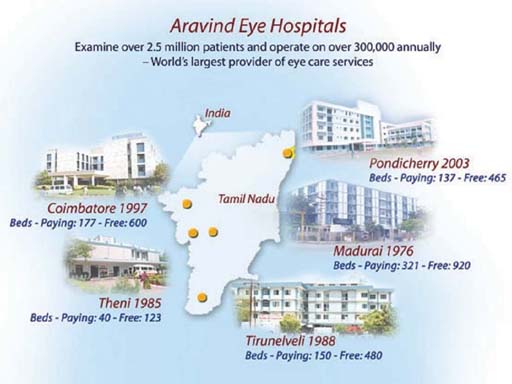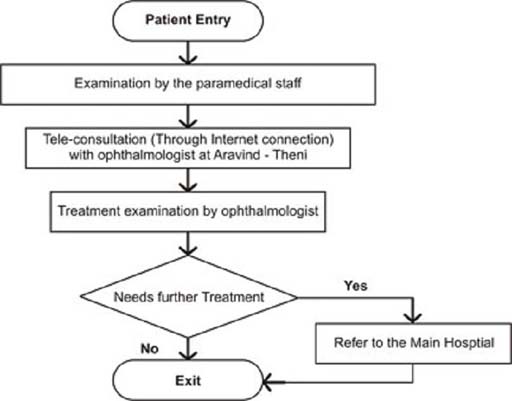By Zeena Johar, President – ICTPH
Intelligence and capability are not enough. There must be the joy of doing something beautiful.”
– Dr. G. Venkataswamy
Under the leadership of Dr. G. Venkataswamy, Aravind Eye Hospital was founded in Madurai, Tamil Nadu, India in 1976 with the mission “to eradicate needless blindness by providing appropriate, compassionate and high quality eye care to all.”
Today, in addition to the hospital in Madurai, there are four other Aravind Eye Hospitals in Theni, Tirunelveli, Coimbatore, and Puducherry, with a combined total of 4100 beds. With less than 1% of India’s ophthalmic manpower, Aravind Eye Hospitals account for 5% of the ophthalmic surgeries performed within India. The unique fee system and effective management, enables Aravind Eye Hospitals to provide free eye care to 60% of its patients.
The Aravind Medical Research Foundation (AMRF) was formed to investigate issues concerned with causes and treatment of various eye diseases and problems related to delivery of eye care. The research activities at AMRF reflect Aravind’s commitment to finding new ways to reduce the burden of blindness. The combination of high clinical load, extensive community participation, and access to a large network of eye hospitals provide ideal opportunities for conducting clinical, laboratory and population-based studies and social and health systems research.
Aurolab – Aravind’s manufacturing division works towards manufacturing affordable ophthalmic products for the developing world. Aurolab has set up manufacturing facilities to produce intraocular lenses (IOLs), suture needles, pharmaceuticals, and surgical blades.
Lions Aravind Institute of Community Ophthalmology – LAICO:
Established in 1992, LAICO is Asia’s first eye care training institute. In addition to eye care management and skill based training programs; LAICO also shares its knowledge through consultancy and capacity building programs. Through its contract model of managed hospitals LAICO (and Aravind) manage eye hospitals with Aravind-trained personnel and provide necessary technical support to four Aravind Managed Eye Hospitals in West Bengal, Gujarat and Uttar Pradesh.
Aravind Tele-Ophthalmology Network was launched in the year 2002 by Aravind Eye Hospital along with Orbis International and Acumen Fund, USA. Since then, a Telemedicine link has been established between all the satellite hospitals of Aravind. In June 2004, with the support of the World Diabetes Foundation (WDF) and the Indian Space Research Organisation (ISRO), a satellite Van was deployed to screen patients in rural areas.
 An integral part of Aravind is its community outreach programs which include screening eye camps, school eye health programs, village volunteer programs all of which are different strategies for taking eye care service to the doorstep of the community. They provide curative, preventive and rehabilitative care in the community along with IEC (information, education & communication) programs to improve service delivery to potential patients in the community.
An integral part of Aravind is its community outreach programs which include screening eye camps, school eye health programs, village volunteer programs all of which are different strategies for taking eye care service to the doorstep of the community. They provide curative, preventive and rehabilitative care in the community along with IEC (information, education & communication) programs to improve service delivery to potential patients in the community.

|

|
Vision Centre: The model of a vision centre emerges from Vision 2020 – The Right to Sight, a global initiative of International Agency of Prevention of Blindness (IAPB – a global machinery working across the world for the prevention of avoidable blindness). IAPB proposes a four tier pyramid model to provide eye care, suggesting vision centres at the primary level. Aligning with this initiative, Government of India is planning to set up atleast 20,000 vision centres across the country. Being one of the forerunners in experimented alternate approaches, Aravind Eye Hospital has set up 35 such vision centers across Tamil Nadu.
Each vision centre covers a rural population of 50,000 achieving remarkable penetration into the community – up to 40% in the first year itself. The centres are equipped with basic ophthalmic equipment like Slit Lamp, Streak Retinoscope, Direct Ophthalmoscope, Trial sets, Tonometer, Basic sterilizers, BP apparatus and 90D Lens and a computer with a digital camera (in the place of webcam) and internet connectivity. A vision centre is managed by a well trained ophthalmic assistant performing slit lamp examination, refraction, treating minor ailments, counselling etc. All the patients examined at the vision centre are consulted with the ophthalmologist at Aravind Eye Hospital. Patients requiring procedural intervention are referred to the Aravind Eye Hospital. A consultation fee of Rs 20/- provides for a basic eye examination, along with diabetic screening for walk-in patients through a urine sugar test for Rs 5/- and blood sugar at Rs 25/-. Prescription glasses are also dispensed at the vision centre with prices ranging from Rs 150/- to Rs 600/-. On an average, a vision centre refers 1-2 cataract patients to the Aravind Eye Hospital, and 1-2 refraction patients requiring prescription glasses.
Aravind Eye Care System is a remarkable example of an organization completely driven by its vision, and mission aligned individuals organically providing ophthalmic solutions for the most deserving populations.






Leave a Reply
Be the First to Comment!